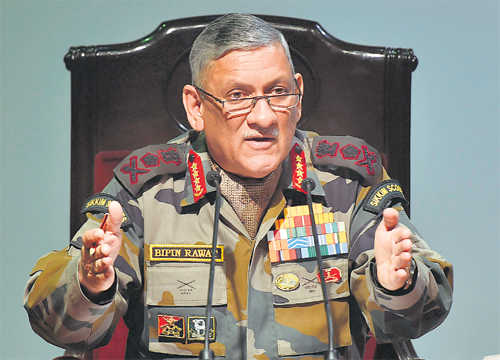When the General speaks, his word reaches every man and woman and boosts their morale. In this age of information warfare, every word makes an impact on both sides of the fence.

Lt-Gen RS Sujlana (retd)
IS General Bipin Rawat loquacious? First, the counter to the statement of Bajwa, the Pakistan Army Chief, made in the Pakistan Parliament.
Countering Pak’s Bajwa
Terming his call for peace as contrived, is based on experience, intelligence inputs and the ground realities of which the General is the best judge. All these inputs must be pointing contrary to the intent conveyed by Bajwa. What has been our experience in the past? Firstly, no statement emanating from Pakistan can be taken at face value. Secondly, whenever the situation warranted a joint approach, but the thrusts of the foreign and defence policies were at variance, the nation received a raw deal. A few examples will drive home this point: a) starting with the Indo-Pak war of 1947-48, approaching the UN against military advice, accepting a ceasefire and a flawed proposal to hold a plebiscite which can never take place on original terms; b) post the Indo-Pak war of 1965, strategically important areas were returned to our disadvantage; c) the Simla Agreement after the war of 1971 saw over 90,000 Pakistan prisoners of war returning home with no positives coming India’s way. Rather, Pakistan retained some of our captured soldiers who are still rotting in their prisons. The intent was evil and marked lack of concern from our side; d) the infamous Agra Summit with Musharraf, the failed bus diplomacy ending in the Kargil war! Need one say more about contrived talk?Thus, there is nothing amiss when the Army Chief calls it contrived. Actions on ground must follow words.
Views on Doklam
With regards to China, the 1962 debacle is enough to show the disjoint between our foreign policy and defence policy. The Chinese have continued non-stop transgressions across the marked border. At Doklam, our tough stand was aimed to stop such transgressions. In such situations, the nation expects the Army Chief to take a tough stand and that is what he did.The armed forces have their own ‘niche’; nations perceive their requirement to fulfil their security needs which the military carries out. In our country, the armed forces have performed their roles most commendably with immense sacrifice. But to opine that the political narrative is getting militarised is farfetched. There are no indicators to support this view. The military has a limited say in matters of significance. Rather, the forces don’t even have a say in their own matters!
About education in Valley
In making the statement about the education system in the Valley, the General has possibly ventured into domestic politics. But he has addressed an issue which should have been done long ago. Political parties of all hues, including the tough, rightest, nationalist ruling party, thought it wise not to rock the boat when it was known that the textbooks in question have been a major source of radicalisation of the youth. Someone had to hold the bull by the horn. The General did so. The aim was clear: to target the aetiology of the growing fundamentalism in the youth, and thereby wean the youth away from a path of self-destruction. Even limited success in this matter will have positive fallouts and reduce the gun culture and, most importantly, bring an end to the daily fatal casualties both in the civil society and the security forces and build a path to peace!
Reality of military
The reality of the military in India can be judged by some facts: repeated undermining of their status; lack of modern wherewithal; refusal to rectify the injustice done in the Seventh and past Central Pay Commissions; their parent ministry (MoD) repeatedly moving the courts to counter their genuine demands; the negation of full OROP; maltreatment of the veterans and of course; the ever-elusive Central War Memorial. While memorials to commemorate our heritage are being planned (and rightly so), why the hesitation to build one for the military? So, are there really any grounds to show creeping militarisation in politics?
Fulfilling a duty
The need to take a stand and fulfil one’s duty is a must. History narrates that when Emperor Jahangir asked Guru Arjan Dev ji why he had supported Prince Khusro who had rebelled against him, the Guru had remarked, “If I had not assisted him in his forlorn condition…all men would despise me for my heartlessness and ingratitude, or they would say that I was afraid of thee!” The Army Chief would somewhat be in a similar predicament if he did not speak boldly. As physically he cannot reach out to every soldier, his word will reach every man and woman, boost their morale and motivation. Besides, in this age of information warfare, every word makes an impact on both sides of the fence. Such words are extremely important. The General must be allowed to fulfil his bounden duty, assist in preserving the sovereignty, unity and territorial integrity, no effort should be made to gag him or place him in a Catch 22 situation!
